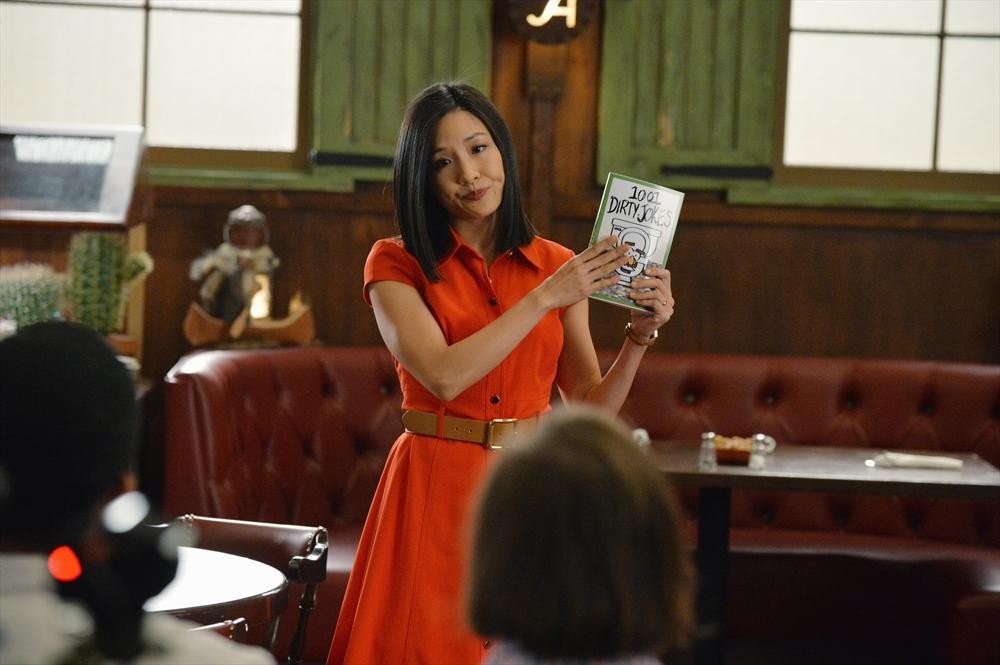Swink, Robyn S. “Lemony Liz and Likable Leslie: Audience Understandings of Feminism, Comedy, and Gender in Women-Led Television Comedies.” Feminist Media Studies, vol. 17, no. 1, 2017, pp. 14-28. ProQuest, http://prx.library.gatech.edu/login?url=https://search.proquest.com/docview/1857759793?accountid=11107, doi:http://dx.doi.org/10.1080/14680777.2017.1261832.
This article discusses how viewers interpret shows with female comedian showrunners that such as 30 Rock, Parks and Recreations, The Mindy Project, and Girls. The author interviewed watchers of these shows to understand their understandings of feminism based on the shows. These shows are in the post-feminist era which involves the assumption that feminism has already completed what it set out to complete. The majority of the shows include a White middle-class woman who is independent. The lack of diversity in these shows excludes the fact that intersectional feminism still has yet to make significant progress. The writer of the article found that often times in these shows, even with a female showrunner, the male characters are the ones who are seen as funny. These shows are often seen as feminist shows by description, but many of the viewers interviewed did not see all the female show runners’ characters as feminist.
This article provides insight into how viewers interpret shows that are supposedly feminist with female show runners.
Lauzen, Martha. “THE FUNNY BUSINESS OF BEING TINA FEY: Constructing a (Feminist) Comedy Icon.” Feminist Media Studies, vol. 14, no. 1, 2014, pp. 106. ProQuest, http://prx.library.gatech.edu/login?url=https://search.proquest.com/docview/1509208764?accountid=11107.
This article begins by discussing how Tina Fey has gained success in spite of the notion that women cannot be funny. Her form of comedy includes degrading herself to make others laugh. However, this form of comedy among women also makes a comment on women being seen as inferior to men. Fey often comments on her appearance to show society that she does not value what is valued by our society in a women’s appearance. Fey also addresses the prejudices against women in comedy by reprimanding those who discriminate against women in the industry in their place and pointing out to reporters when they ask a question which they would not ask a male. Fey herself has very rarely labeled herself a feminist, but her actions show she is.
This article provides an evaluation of Fey’s role as a woman in comedy who has had success. It gives an interesting insight to how Fey’s form of comedy also comments on women’s perceived inferiority to men.
Morreale, Joanne. “Do Bitches Get Stuff done?” Feminist Media Studies, vol. 10, no. 4, 2010, pp. 485. ProQuest, http://prx.library.gatech.edu/login?url=https://search.proquest.com/docview/863787606?accountid=11107.
This article discusses Tina Fey and her character Liz Lemon on the show 30 Rock. The article evaluates whether or not Tina Fey’s character Liz Lemon truly represents her “Bitches get stuff done” statement she once made. Liz Lemon provides contradictory imagery to the feminist character she is intended to be. Her appearance is unattractive which supports the negative stereotypes of feminists. In addition, she is stereotypically portrayed as a woman who lacks confidence, wishes to be in a relationship, and struggles with technology. The article also points out that 30 Rock is constrained by network television which results in Liz Lemon being a less politically divisive. It contrasts Liz Lemon with a character on Lisa Kudrow’s HBO show The Comeback. Since the show is on HBO it is allowed to take more risks. The Comback highlighted problems in reality television and other aspects of the entertainment industry. However, the show was canceled because it failed to collect a big enough audience.
This article provides insight into some of the restrictions on female comedians. Furthermore, it highlights how even Tina Fey, a well-established comedian, cannot take a fully feminist stance within comedy.
Child, Ben. “Tina Fey: It’s a ‘Terrible Time’ for Women in Comedy.” The Guardian, Guardian News and Media, 3 Mar. 2016, www.theguardian.com/film/2016/mar/03/tina-fey-its-a-terrible-time-for-women-in-comedy.
This article discusses Tina Fey’s comment about how it is a terrible time for women in comedy. Even when their work is substantially better in quality than their male counterparts, women in comedy are still getting paid less than men. Additionally, women are still getting asked sexist questions by reporters. During press for their movie Sisters, Amy Poehler and Tina Fey would be asked questions intended to turn them against each other. This is a common sexist move that is used with the intention of portraying women as catty rather than supportive of each other. The article continues to describe how Fey sees the importance of support in the competitive industry. To get anywhere in this industry, women must not backstab each other because one woman’s failure does not lead to another’s success.
This article provides insight into how the press treats female comedians. It demonstrates how the media still uses sexist tactics against female comedians.
Loofbourow, Lili. “Tina Fey Doesn’t Need David Letterman’s Approval.” Slate Magazine, Slate, 17 May 2018, slate.com/culture/2018/05/tina-fey-rachel-bloom-and-the-death-of-male-approval-in-comedy.html.
This article discusses interviews between Rachel Bloom, Tina Fey, and two powerful men in comedy. In these interviews, the women, rather than accepting the praise of the male comedians seen as legends, address the problems in their statements in a nonconfrontational way. Tina Fey refuses to accept the approval of a controversial skit from David Letterman. Letterman repeatedly attempts to form a bond with Tina Fey over the common scenario of an audience having a bad reaction to the skit. However, Fey sees the reaction from the audience as a learning experience while Letterman sees the reaction as the audience not understanding him. In Blooms interview with Marc Maron, Maron attempts to express his approval of her show by calling it a guilty pleasure. However, this description invalidates her work as a female comedian. Both women’s refusal to accept the male comedians’ approval demonstrates that they do not need male validation, which would require them sacrificing their ability to call the men out when they are being sexist.
This article shows women comedians taking their own paths rather than choosing to be accepted into the male world of comedy at the expense of their feminist stances.
“Tina Fey: ‘Men Are Still Getting Paid More for a Lot of Garbage’.” The Independent, Independent Digital News and Media, 2 Mar. 2016, www.independent.co.uk/arts-entertainment/films/news/tina-fey-on-women-in-comedy-men-are-still-getting-paid-more-for-a-lot-of-garbage-a6907721.html.
This article highlights Tina Fey’s frustration with the wage gap for women in comedy. For male comedians, if they are famous, they can sell almost any movie that they put together. Women comedians are constantly fighting for success in the industry. The success of several movies with female comedians has lured people into believing women are easily able to be successful in comedy. However, Tina Fey believes that this is false. Before it even premiered, the newest remake of Ghostbusters starring women as the Ghostbusters received many negative reviews just because it starred women. Just like original male Ghostbusters, all the female Ghostbusters were from the cast of Saturday Night Live. That achievement alone should have given them some credit among the critics, but their gender stood in the way of the public giving the movie a chance.
This article provides insight into how critics fail to see women as funny even when they have the same merits as the male comedians.













